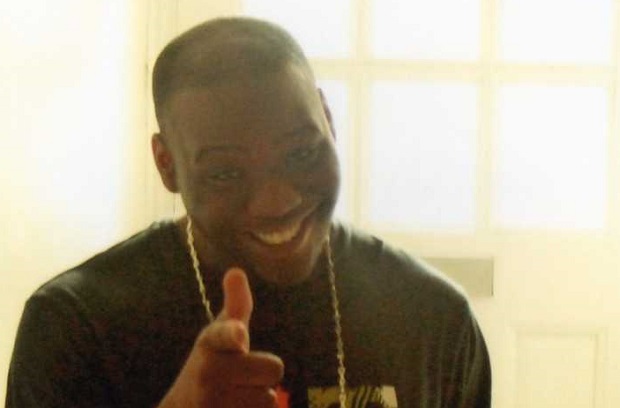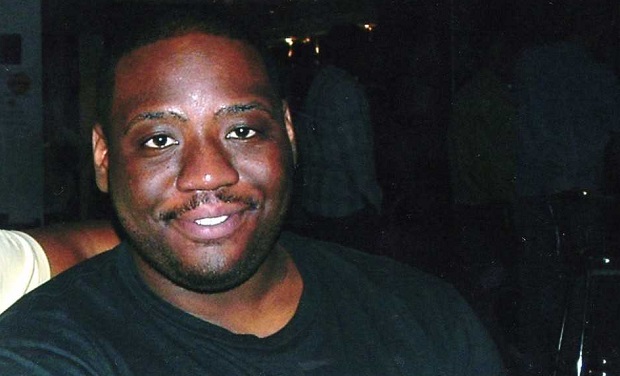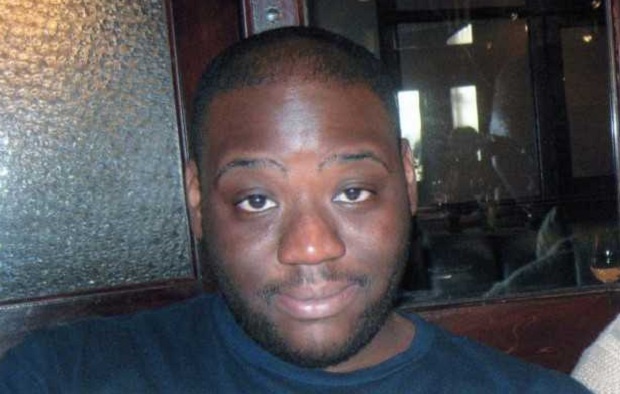Feburary 2013
compiled from various sources
published: This is Croydon Today – Feb 2013
OLASENI Lewis was much-loved by friends and family, had high ambitions to study abroad and a bright future ahead of him. But his life was cut brutally short after dying in intensive care following a fatal police restraint. Nearly two and a half years and two postponed inquests later, David Churchill speaks to a family still battling for answers and justice…
NEXT month, instead of celebrating their son’s 26th birthday, Olaseni Lewis’s parents were destined for an inquest court room to hear the events surrounding his unexplained death.
Olaseni, 23, a successful IT graduate from Kingston University, was pinned face down on the floor by 11 police officers for 40 minutes in a hospital seclusion room, never to regain consciousness, despite having no history of mental or physical illness.
Earlier that day, he had visited Croydon University Hospital with his family to seek professional help after he had begun behaving strangely, alternating between “calm and agitated phases”.
The hospital then sent him for observation in a “section 136 suite” at Maudsley Hospital, a psychiatric facility in south London, where it was decided he required a few days for assessment, treatment and rest.
However, due to his South Norwood address, he was transferred to Bethlem Royal Hospital in Beckenham, where he admitted himself voluntarily.
Having helped him settle for the night, his father and mother, Conrad and Ajibola, and his best friend, Omari Faria, left him to fall asleep at about 8pm.
But less than four hours later, he was on his death bed wired to a life support machine after being restrained by police.
Ajibola, 63, recalled the moment she left her son at Bethlem for the night on August 31, 2010. She said: “He was fine. He was saying, ‘should I have a bath or get to sleep?’ He was talking about what he might eat and then he said he would go to sleep. He was just fine when we left him.
“I wanted to sleep in the car park of the hospital that night, in the car, because I couldn’t bear to leave him, but my family convinced me to come home.”
But around two hours later, she received a phone call from Omari, telling her of an “incident”.
She said: “I came home to bed and Omari calls to say, ‘have the hospital been in touch? There has been an incident’.
“So I phoned up about 10pm and they said that I should go to Mayday [Croydon University Hospital] where he has been taken.
“So we got to Mayday about midnight and they were stabilising him and then he was put on life support.”
Four days later, brain stem death – caused after oxygen to the brain is obstructed – was confirmed and his life support machine switched off.
But nearly two and a half years later, not one of the 11 officers has been interviewed under caution, which is the procedure that should take place if there is a “possibility” any crime or wrong-doing took place.
Meanwhile, the Independent Police Complaints Commission (IPCC), which conducted the investigation into the police, has offered the family no explanations, while both the Bethlem Royal Hospital and the CPS have provided little information.
The family’s lawyer Raju Bhatt, who specialises in neglect of police duty and was appointed to the Hillsborough disaster panel by the Home Office, said officers should “no doubt” have been interviewed under caution and branded the IPCC probe “fundamentally flawed”.
He said: “What we know is, there was a very long restraint in the face-down position and we know that the post mortem has revealed the restraint to be at the heart of the mechanism leading to the death.
“It doesn’t take a super detective to see that there may be issues to consider here.
“There is failure that is a shocking abdication of responsibility. We are placing the burden on this family to raise questions we should be raising on their behalf through the CPS and IPCC.”
Mr Bhatt also does not believe any police officers will be prosecuted and suggested the continual postponement of Olaseni’s inquest is a delaying tactic.
He added: “Time is of the essence in terms of the investigation. Investigative manuals talk about the golden hours.
“In these first few hours the evidence is there and with every hour, let alone every week, month, year, the evidence is dissipated. It is inconceivable they would take this long if they were going to prosecute.
“When you see a performance like this from the authorities, you are left with no option to conclude that what you’re seeing is an exercise explaining away what has happened.”
Although accounts are scant, the family understands that Olaseni, who had become restless, was restrained three times – once by hospital staff and twice by police after being called by nurses.
Bethlem Hospital protocol states police are only to be called in “exceptional” circumstances, but the hospital has refused to say whether there was anything exceptional in Olaseni’s case.
The family said the hospital told them police handcuffed the 23-year-old and led him down some stairs to a seclusion room where he was held, face down on the floor, by 11 officers for at least 40 minutes in two struggles.
He was then said to have been left on his own in the room where he lay motionless before being taken to Croydon University Hospital.
Ajibola, a former lawyer, said: “We are devastated, disappointed and completely disillusioned by the whole thing.
“We want police to be held to account and a thorough, transparent investigation with the police questioned under caution.
“You feel as if you’re victimised over and over again. You’re a victim already, but you’re being victimised again by an investigation that hasn’t been adequate and by the constant delaying.”
Conrad, an IT consultant, said he was concerned the police were investigating themselves, adding: “Here we have one of the highest bodies [IPCC] that is to be respected and should be responsible but they have not fought for our purpose.
“I have sleepless nights. This is what we go through with the delay of the IPCC and the CPS.
“We feel torn to pieces by the whole thing, the handling of the issue and the loss of our son. We just want justice. We can’t put closure to it until we get that.
“I’m not looking for revenge, I’m just looking for justice. There is no compensation enough for the death of my son, but what I would like is to see things being done properly, so no other family has to suffer the same fight we are going through.
“Regardless of what he did, he didn’t deserve to die.”
Ajibola and Conrad spoke fondly of a son who ‘stuck up for people being bullied’ at school, a student who was ‘self-motivated’ and ‘focused on his work’ and who had ambitions to study for a PhD after completing his masters in IT at Kingston University.
He was a ‘gentle giant’ with a zest for adventure and was much-loved by his friends, family and sisters Kemi and Lara.
Mother Ajibola said: “He had a real sense of adventure and fun. He was a lovely, friendly, a lovely person and wasn’t afraid of new things.
“He wanted to study for a PhD in America, which he would have done, we’re sure. He studied IT at Kingston and he loved his computers and was always focused on his work.”
The 63-year-old told how she once received a call from Olaseni’s former head teacher at Archbishop Tenison’s C of E School, informing her he had stuck up for a fellow pupil being bullied at school by older students. “That’s the kind of person he was, always looking out for others,” she said.
She added that on one family holiday in Florida, her son had attempted to reach Cuba by jet ski after going too far out to sea and having to be hauled back.
Conrad said: “He was an achiever. I did IT and he followed me into that.
“He was self-motivated and very successful. Whatever he’d have done he would have been good at it.
“We were very proud of him with what he achieved and the way he was with others. He is missed by the whole family.
“He was a gentle giant and we are never going to forget him.”
Olaseni’s inquest has been postponed for the second time in eight months after CPS received fresh information from the Health and Safety Executive.
A spokesman confirmed the new material was received at the end of January and needs to be considered fully before an inquest takes place in case they decide to prosecute anyone over the death.
The spokesman said: “We continue to carefully review all the evidence in relation to the tragic death of Olaseni Lewis.
“Further material has since come to light, which we are currently considering.
“We understand that the postponement of the inquest is distressing for the friends and family of Olaseni and we are seeking to progress this case as swiftly as possible.”
It is necessary that an inquest does not take place while potential criminal proceedings are considered, as it could later prejudice any trial.
However, the Lewis family’s lawyer, Raju Bhatt, does not believe the CPS’s stalling is a sign they will prosecute. He said: “It is inconceivable they would take this long if they were going to prosecute.”
Scotland Yard said because the case had been referred to the IPCC it could not comment.
A Bethlem Royal Hospital spokesman said a full internal investigation had been carried out after the restraint that led to Olaseni Lewis’s death, ending in a review which has seen practices changed and more meetings between clinicians and police introduced.
The hospital spokesman said: “We are very sorry that this tragic incident occurred and we have offered our sincere condolences to the family of Olaseni Lewis.
“We met the Lewis family to ensure that they had input into our internal investigation and we have shared our conclusions with them.
“We will fully share our investigation’s conclusions with the inquest to be held.
“Following our investigation we instituted meetings with senior police officers in our local boroughs, to review our respective operational policies and how they impact on people with mental health problems, and we have since agreed a joint protocol with them.
“We also meet regularly liaison officers at borough level.
“This autumn we will be launching a new training package with the police and London Ambulance Service that specifically addresses the issues of managing people when they are acutely unwell.”
The IPCC is seeking legal advice in the wake of Olaseni’s death following police restraint, its commissioner, Rachel Cerfontyne, has told the Advertiser.
She said: “The IPCC is taking the concerns of Mr Lewis’s family very seriously and we are reviewing our investigation, including seeking the advice of the Crown Prosecution Service and other legal expert opinion to determine whether there is more we can and should be doing.
“We continue to consult with Mr Lewis’s family to keep them abreast of any developments and we recognise the family’s frustration that they have had to wait for answers as to what happened. Our focus remains on providing them with the most thorough possible investigation.”
Read more: http://www.thisiscroydontoday.co.uk/South-Norwood-man-held-face-police-40-minutes/story-18155589-detail/story.html#ixzz2MZA4ltps
Follow us: @thisiscroydon on Twitter | thisiscroydontoday on Facebook
 “I have been struck by the pain and suffering of families who are still looking for answers.”
“I have been struck by the pain and suffering of families who are still looking for answers.” “I would have thought she might have asked to meet us. Not heard anything,” she said.
“I would have thought she might have asked to meet us. Not heard anything,” she said. It’s acknowledged at issue are allegations of ‘very serious failures’; that it is a high profile case; that there is great concern and low levels of confidence among BME communities about police treatment of mental health sufferers; and there are grave matters here.
It’s acknowledged at issue are allegations of ‘very serious failures’; that it is a high profile case; that there is great concern and low levels of confidence among BME communities about police treatment of mental health sufferers; and there are grave matters here.
